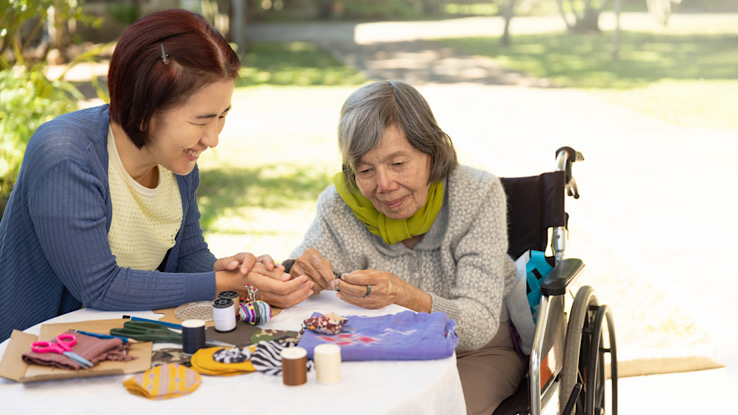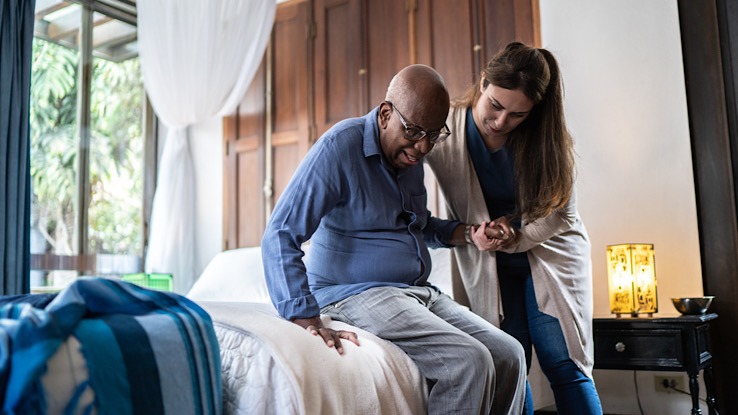I Never Wanted to End Do It Over Again

Dementia is the loss of a person's ability to recollect, remember, and problem-solve. This tin really impact how they live each day. There are several different types of dementia. But the exact causes are unknown.
While dementia is more common in older adults, and historic period is a cardinal risk factor, dementia is not a normal part of crumbling. About 1 in every iii people older than 85 have some class of dementia, but many people live full lives without always developing dementia.
Dementia gets worse over time and information technology differs for each person. This makes it hard to know how long someone with dementia will alive for. At this fourth dimension, in that location are no widely available treatments to forestall, cure or slow the progression of dementia. This ways that many people must larn to live with dementia and brand care management plans for the future.
If you're a caregiver, you lot are an important part of the care program of someone with dementia. Find out how you can provide support for someone with late-stage dementia.

Equally a person's dementia gets worse, they will need more than help. They begin to experience many changes to their health and daily life over a period of several months or years including:
- Memory loss
- Having a hard time eating, drinking, and swallowing
- Having a hard fourth dimension doing personal care tasks such equally dressing themselves
- Finding information technology hard to talk to others because they don't sympathize what is beingness said
- Having a hard time forming sentences to speak
- Moving less or needing aid to walk
- Losing weight
Your Role as a Caregiver
Your role as a caregiver is to support the person with dementia. Your goal is to assistance maintain a high quality of life for them. Information technology may get-go to become hard to communicate considering of their retentivity loss and loss of spoken language. Try finding other means to connect through other senses like bear on, sound, sight, gustation and aroma. This can include playing their favorite music, or brushing their hair. Think almost the things they similar, and effort to include that throughout the twenty-four hour period.
How to Support Determination Making
As someone experiences more memory loss, information technology is important to have difficult discussions early. The person with dementia may start making a programme with their family and doctors then that they are as comfortable as possible at the cease of life. The discussion can feel overwhelming, but information technology will generally boil downwards to these iii considerations:
- How the person would like to exist cared for at the terminate of life including advance medical decisions.
- Where the person would like to live at the end of life. For example, they may want to stay at abode or alive in a facility.
- Who the person would like to care for them at the finish of life. This tin can include family members or hiring a caregiver.
These decisions together are known as advanced care planning, and it usually requires some legal documentation. It will exist helpful to get a lawyer to help make an advance directive. An advance directive can also include:
- The person's decision to turn down a specific blazon of treatment, like a ventilator.
- Designating a person to brand medical treatment decisions after they're no longer able to make their own decisions.
As the caregiver, you lot can help support these decisions. Attempt to learn as much as you lot tin can about their terminate-of-life wishes, and then you tin assist with conversations with doctors, family and friends if needed.
End-of-Life Care Options for Dementia

1 of the main decisions that will exist made is where the person will live and how they will receive the care and back up they need. Sometimes, additional support is needed outside of the domicile to care for someone in late-stage dementia. This may hateful moving the person to a facility so they can get the care they need. Options include:
- Staying at habitation: Nigh people adopt to proceed living at home every bit they get older. This is sometimes but possible for someone with early-stage dementia. Someone from a local home-based care assistance programme can provide their care. Or a family member can deed as an informal caregiver.
- Residential care facility: When a person needs a lot more than help with their intendance, they may need to consider a residential care facility. Some options are a nursing home or specialist dementia care facility. This gives them 24-hour intendance from trained professionals.
- Palliative care: Towards the end of life, palliative intendance or hospice care are options.
You tin learn more well-nigh long-term care options at LongTermCare.gov and observe a range of suitable care providers at Medicare.gov.
Planning Alee Financially
Decisions regarding how and where the person with dementia would like to be cared for will also require some fiscal planning. The costs of medical and long-term care can be expensive. You can expect into options to support their decision. There are many government programs available to assist cover healthcare costs. Every programme is different, and so bank check the benefits and eligibility requirements.
Getting Support
The important affair to remember is that you are not lonely. You tin find information about what to expect and how best to care for someone with late-stage dementia. Endeavor these resources:
- National Institute of Aging
- Alzheimer's Association
- Eldercare Locator (discover local services in your area)
Caregiver Health
When you're caring for someone with late-phase dementia, you're probably not thinking about your own wellness. Just caring for someone with late-stage dementia tin can be overwhelming. You're taking on many responsibilities, so it'due south of import to also take care of your health equally well.
Take time to:
- See the dr.: Visit your doc regularly (at to the lowest degree one time a year). Exist certain to talk virtually any changes to your stress levels, and whatever symptoms you are having.
- Exercise: In that location are so many wellness benefits to do. Endeavour to find some fourth dimension each day, even with a decorated schedule. Just ten minutes a 24-hour interval can help!
- Eat well: You are what you lot eat. Continue up with a healthy nutrition. Yous may try new recipes to change things upward a bit.
- Get respite intendance: This is a way that y'all can suit alternate care for your loved i for a few hours, days or weeks at a fourth dimension. Respite care tin can happen in their home or at a healthcare facility. This can requite y'all a much-needed break, or time to make more permanent arrangements.
- Join a support group : You may too benefit from finding a support group of people who are going through a similar situation.
Resources Links:
- "Alzheimer's Illness and Related Dementias" via National Institute on Aging
- "How to know when a person with dementia is nearing the end of their life" via Alzheimer's Social club
- "Cease-of-Life Care for People With Dementia" via National Plant on Crumbling
- "Dementia and stop of life planning" via NHS
- "Legal and Fiscal Planning for People with Dementia" via National Constitute on Aging
- "Caregiver Health" via Alzheimer's Association
Source: https://www.symptomfind.com/healthy-living/end-of-life-care-dementia-tips-for-caregivers?utm_content=params%3Ao%3D740013%26ad%3DdirN%26qo%3DserpIndex
0 Response to "I Never Wanted to End Do It Over Again"
Post a Comment